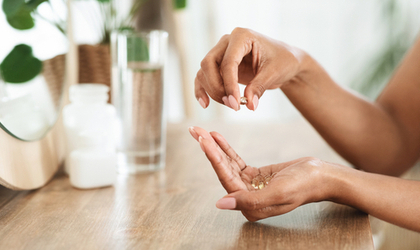
There’s a lot you can do to support your health and that of your growing baby during pregnancy. Aside from staying active, getting plenty of sleep, and practising self-care, following a balanced, whole-food diet will lay the foundation for optimal health for you and your baby.
However, even with a pantry full of pregnancy superfoods, you can still run into nutritional gaps. And that’s where pregnancy vitamins come in.
Why take folic acid in pregnancy?
You’re probably familiar with calls for all pregnant women and those trying to conceive to take folic acid (folate). Folate refers to vitamin B9, a water-soluble B vitamin naturally found in food. Folic acid, on the other hand, is the term used to describe the synthetic form of folate in nutritional supplements and added to fortified foods.
Folate helps form the neural tube, part of a baby’s nervous system. Supplementing with folic acid during pregnancy may reduce the possibility of neural tube defects, including spina bifida (1). Besides brain, spine, and spinal cord defects, impaired folate status may increase the risk of low birth weight (2).
The natural world is teeming with folate; you can find it in leafy green vegetables, dried beans, and citrus fruits. You can also find folic acid in fortified foods like cereals and orange juice. However, it’s still hard to get the amount needed to protect your baby from food alone.
In the UK, health officials recommend that women trying to conceive should take 400-microgram folic acid every day until the 12th week of their pregnancy (3). If you weren’t taking folic acid before conception, it’s advisable to supplement as soon as possible.
By week 12 of pregnancy, a baby’s neural tubes have sealed, so, theoretically, there’s no need to continue taking folic acid. But if your pregnancy multivitamin contains folic acid, it’s perfectly safe to carry on with it.
We recommend choosing a prenatal health multivitamin that provides folic acid in the most bioavailable form of L-methylfolate, which the body can readily use.
Why take vitamin D3 in pregnancy?
Alongside folic acid, experts recommend taking vitamin D3 throughout pregnancy and when breastfeeding. Vitamin D3 helps regulate calcium and phosphate equilibrium, which supports the growth of a baby’s bones, teeth, and nervous system (4).
Moreover, the World Health Organisation suggests low vitamin D levels are associated with an increased risk of gestational diabetes, premature birth, pre-eclampsia and other bone conditions, like rickets (a disease that affects bone development in children) (5).
While you can find small amounts in oily fish, eggs and red meat, sunlight is the best source of vitamin D3: when sunlight hits the skin, the body synthesises vitamin D3. During summer, most fair-skinned people can make enough vitamin D3 from having their face, hands, and arms in the sun for a few minutes, while people with darker skin need more sunlight.
If you don't have adequate sun exposure – which can be difficult if you live in the UK, especially between October and March – spend most of your time indoors or cover your skin with clothing, you will struggle to get enough vitamin D3 from food alone. This can be even more challenging if vegetarian or vegan since most sources derive from animal products.
With this in mind, pregnant and breastfeeding women should consider taking a daily supplement containing 10µg as a maintenance dose. Vegan mums-to-be can look for a suitable plant-based vitamin D3 formula derived from lichen.
Why take iodine in pregnancy?
Iodine is another vital nutrient for pregnancy. Iodine supports the production of maternal and foetal thyroid hormones, which helps the development of a baby’s brain and nervous system (6).
During pregnancy, the recommended daily allowance for iodine jumps from 150µg to 250µg. Although you can find iodine in milk, dairy products and fish, it can be hard to meet this increased nutritional demand, especially if you’re on a plant-based diet.
Supplementing with 140-150µg of iodine will go a long way in helping you achieve your RDA in pregnancy. Try to find a formula that provides iodine as potassium iodide.
Why take iron in pregnancy?
During pregnancy, the amount of blood in your body increases – and so does the amount of iron you need. You now need around 27mg daily. Iron supports the transportation of healthy red blood cells, which carry oxygen around your body to your tissues, organs, and, crucially, your baby (7).
If you're carrying twins or multiple babies, experience severe morning sickness, are a strict vegan, or have anaemia – a condition characterised by a shortage of red blood cells – you're more likely to have low iron in pregnancy. Your GP will be able to inform you of your iron levels in routine antenatal blood tests.
The best sources of iron are red meat, fish, chicken, and eggs. However, you can also find iron in plant-based sources, like green leafy vegetables, beans, nuts, seeds, and dried fruit. It’s worth mentioning that the body can’t absorb iron from plant-based foods as easily as that in animal-derived foods. But you can support absorption by eating vitamin C-rich foods at the same meal, including kiwi, berries, tomatoes, and cabbage.
In addition to increasing dietary iron, many women supplement with iron throughout their pregnancy to support their baby’s growth and development, as well as their energy levels. Look for a formula that provides around 17mg, so you have some wriggle room for dietary iron.
Why take choline in pregnancy?
New research suggests choline may play a role in foetal brain development and help prevent common birth defects, making it another essential nutrient during pregnancy (8).
Though the body produces some choline on its own, it doesn’t make enough to meet all your needs while you are pregnant.
Choline is mainly found in eggs, meat, and seafood, so if your diet doesn’t include these foods, then it may be worth taking a supplement to cover any nutritional gaps and support your growing baby.
Why take calcium in pregnancy?
During pregnancy, calcium helps strengthen your baby’s growing teeth, bones, muscles, heart, and nerves, as well as keeping your bones and teeth healthy.
If you don’t have enough calcium in your diet, your baby will leach it from your bones – especially during the third trimester – which can make you more vulnerable to osteoporosis, a condition that causes brittle bones.
Calcium isn’t just found in dairy products like milk, yoghurt and cheese. Tofu, leafy greens, almonds, chia seeds, sardines, and lentils are also excellent sources.
You need 1,000mg of calcium in pregnancy. So, alongside increasing your dietary calcium intake, it might be worth including supplemental calcium to cover any shortfalls.
Why take a pregnancy multivitamin?
Taking a high-strength, comprehensive pregnancy multivitamin is a convenient way to ensure you get enough folic acid, vitamin D3, iodine, iron, choline, and calcium, along with a range of other pregnancy-supporting nutrients.
Although the first few weeks of pregnancy are the most critical time for foetal health, you can safely take a prenatal multi throughout your entire pregnancy and even when breastfeeding.
Alongside your multivitamin, we recommend taking a high-strength fish oil formula or vegan equivalent. Increasing your intake of DHA (docosahexaenoic acid), an essential fatty acid, may support the visual and cognitive development of your growing baby.
Find out more
If you found this article on pregnancy vitamins useful, you can find similar guidance on our health blog. Alternatively, please get in touch with our team of expert Nutrition Advisors, who are on hand to provide free, confidential advice.
References
-
US Preventive Services Task Force. (2023) Folic Acid Supplementation to Prevent Neural Tube Defects: US Preventive Services Task Force Reaffirmation Recommendation Statement. JAMA. 330(5):454–459.
-
Deepa R, Mandal S, Van Schayck OCP, Babu GR. (2023) Vitamin B6 Levels and Impaired Folate Status but Not Vitamin B12 Associated with Low Birth Weight: Results from the MAASTHI Birth Cohort in South India. Nutrients. 15(7):1793.
-
Vitamins, minerals and supplements in pregnancy. (2023). https://www.nhs.uk/pregnancy/keeping-well/vitamins-supplements-and-nutrition/
-
British Journal Of Midwifery - Importance of vitamin D during the antenatal period for maternal well-being. (2020). https://www.britishjournalofmidwifery.com/content/clinical-practice/importance-of-vitamin-d-during-the-antenatal-period-for-maternal-well-being/
-
Vitamin D supplementation during pregnancy. (2023). https://www.who.int/tools/elena/interventions/vitamind-supp-pregnancy
-
De-Regil LM, Harding KB, Peña-Rosas JP, Webster AC. (2015) Iodine supplementation for women during the preconception, pregnancy and postpartum period. Protocol. Cochrane Database of Systematic Reviews. Issue 6. Art. No.: CD011761.
-
Nutrition During Pregnancy. (2022). https://www.acog.org/womens-health/faqs/nutrition-during-pregnancy
-
Roeren M, Kordowski A, Sina C, Smollich M. (2022) Inadequate Choline Intake in Pregnant Women in Germany. Nutrients. 14(22):4862.
Related Posts
Disclaimer: The information presented by Nature's Best is for informational purposes only. It is based on scientific studies (human, animal, or in vitro), clinical experience, or traditional usage as cited in each article. The results reported may not necessarily occur in all individuals. Self-treatment is not recommended for life-threatening conditions that require medical treatment under a doctor's care. For many of the conditions discussed, treatment with prescription or over the counter medication is also available. Consult your doctor, practitioner, and/or pharmacist for any health problem and before using any supplements or before making any changes in prescribed medications.

Olivia
Olivia Salter has always been an avid health nut. After graduating from the University of Bristol, she began working for a nutritional consultancy where she discovered her passion for all things wellness-related. There, she executed much of the company’s content marketing strategy and found her niche in health writing, publishing articles in Women’s Health, Mind Body Green, Thrive and Psychologies.
View More



